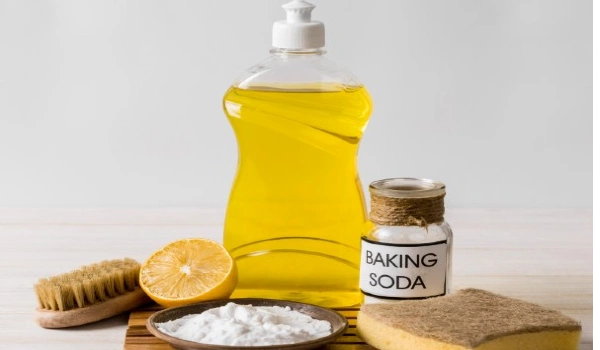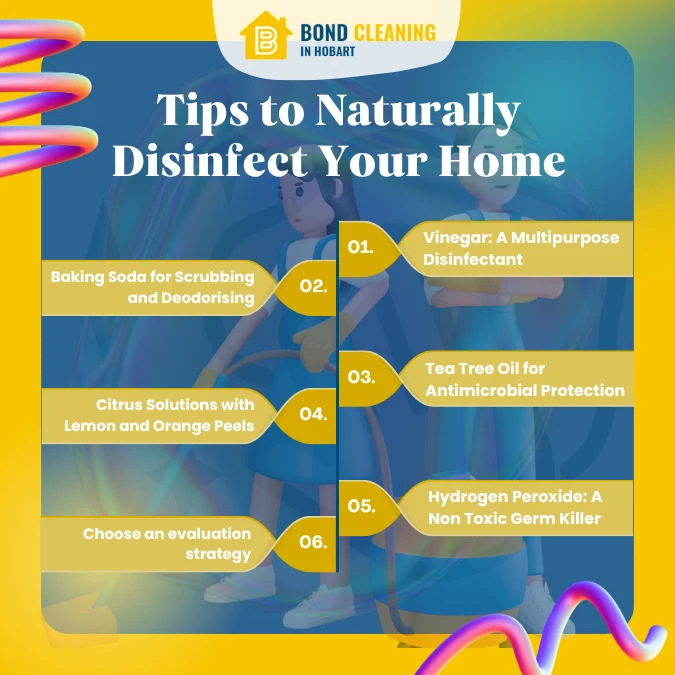
The Practical Guide To Naturally Disinfecting Your Home
Did you know that indoor air can be up to five times more polluted than outdoor air—largely due to the cleaning products we use? The ingredients in many of our conventional disinfectants may certainly kill germs, but they also release volatile organic compounds (VOCs) that linger long after you’ve finished cleaning. If you’ve ever coughed while cleaning the bathroom or been concerned about your youngster touching freshly sprayed counters, you’re not alone. Fortunately, it is possible to keep your home clean while protecting your health.
This article outlines practical, effective methods for disinfecting the home with natural, nontoxic substances that promote both health and environmental sustainability. It touches on everything from everyday surface cleaning to more in depth sanitisation methods, all while steering clear of harsh chemicals. Even experts who focus on detailed Bond Cleaning Hobart are opting for natural alternatives that deliver impressive results without the risk of harmful toxins. With the right mentality, it is entirely possible to have a completely clean home that is safe, fresh, and environmentally friendly.
1. Vinegar: A Multipurpose Disinfectant
White vinegar, a common household item, can also be used as an excellent natural disinfectant. Its acetic acid component can degrade dirt, kill bacteria and remove foul smells. It works nicely on glass, countertops and even bathroom floors. To use it properly, combine equal parts white vinegar and water in a spray bottle and apply it to the affected surfaces. Allow it to settle for a few minutes before wiping clean. For persistent buildup, heat the vinegar solution slightly to boost its effectiveness.
However, avoid putting vinegar on granite, marble or natural stone surfaces since the acid will destroy them over time. This vinegar solution effectively removes oil and fingerprints off surfaces while preserving the fixtures’ finish.
2. Baking Soda for Scrubbing and Deodorising

Baking soda, a natural abrasive, is good for cleaning surfaces, neutralising smells and works particularly effectively in kitchens and bathrooms, where grime can accumulate. Sprinkle baking soda over sinks, tubs and even inside your oven, then scrub using a damp cloth or sponge. Mix it with vinegar or lemon juice to enhance its cleaning prowess.
Aside from its cleaning strength, baking soda is harmless for almost any surface and produces no toxic emissions. It’s ideal for tasks that need manual labour but don’t want the involvement of harmful chemicals.
3. Tea Tree Oil for Antimicrobial Protection
Tea tree oil is well known for its antibacterial and antifungal effects. A few drops can be added to water or vinegar based cleaning solutions to boost their germ fighting properties. This essential oil works particularly well for sanitising cutting surfaces, bathroom tiles and even laundry loads.
To create a disinfecting spray, mix 2 cups of water with 1 teaspoon of tea tree oil and 1 teaspoon of liquid soap. Shake well before use. This solution is not only effective but also leaves a fresh, medicinal scent. For thorough, natural sanitation—especially in thorough Bond Cleaning Ipswich—tea tree oil is a powerful ally.
4. Citrus Solutions with Lemon and Orange Peels
Citrus fruits like lemons and oranges are naturally acidic and have antibacterial properties. Lemon juice can be applied straight on kitchen countertops, cutting boards and faucets. It aids in grease removal and leaves a fresh, energising aroma.
You can also make an all purpose cleanser by infusing citrous peels in white vinegar for a few weeks. Strain the solution into a spray bottle and apply it on a variety of surfaces. This infusion not only improves cleaning efficiency but also lowers waste by recycling fruit peels.
5. Hydrogen Peroxide: A Non Toxic Germ Killer
Hydrogen peroxide is an excellent disinfectant that kills bacteria, viruses, and fungi without harming the environment. Use it undiluted to disinfect bathroom surfaces, toothbrush holders, light switches and doorknobs. Simply pour it into a spray bottle and mist the desired locations, letting it sit for a few minutes before wiping it down.
To keep hydrogen peroxide functional, keep it away from light; if transferred from its original container, store it in a dark bottle. Unlike bleach, it degrades into oxygen and water, making it a far safer choice for families.
6. Steam Cleaning for Deep Sanitisation
Steam cleaning is an entirely natural method of disinfecting and sanitising that does not use any chemicals. High temperature steam successfully eliminates bacteria, dust mites and mould spores on a variety of surfaces, including floors, upholstery, and tiles. Steam mops and handheld steamers are ideal for this purpose.
This approach is particularly beneficial in houses with carpets or fabric covered furniture since it penetrates deep into the fibres. Steam cleaning can be a valuable asset for individuals planning for careful Bond Cleaning Ipswich, as they need to ensure the property looks and smells fresh without violating lease agreements about limited chemical use.
Tips to Naturally Disinfect Your Home

Wrapping Up
Natural disinfection of your home does not need to be difficult or costly. With simple, easily available materials like vinegar, baking soda and essential oils, you can keep your surroundings safe, healthy and spotless. These environmentally responsible practices not only protect your family’s health, but also help to lessen your household’s environmental effects. Clean smarter, live healthier. Happy Cleaning!

